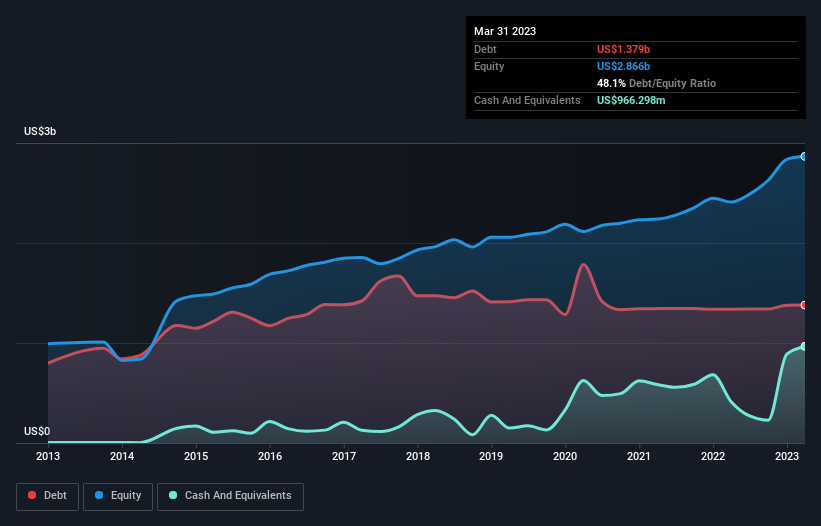- United States
- /
- Consumer Durables
- /
- NYSE:TPH
We Think Tri Pointe Homes (NYSE:TPH) Can Stay On Top Of Its Debt

David Iben put it well when he said, 'Volatility is not a risk we care about. What we care about is avoiding the permanent loss of capital.' It's only natural to consider a company's balance sheet when you examine how risky it is, since debt is often involved when a business collapses. As with many other companies Tri Pointe Homes, Inc. (NYSE:TPH) makes use of debt. But is this debt a concern to shareholders?
Why Does Debt Bring Risk?
Generally speaking, debt only becomes a real problem when a company can't easily pay it off, either by raising capital or with its own cash flow. Ultimately, if the company can't fulfill its legal obligations to repay debt, shareholders could walk away with nothing. However, a more common (but still painful) scenario is that it has to raise new equity capital at a low price, thus permanently diluting shareholders. Of course, plenty of companies use debt to fund growth, without any negative consequences. The first thing to do when considering how much debt a business uses is to look at its cash and debt together.
View our latest analysis for Tri Pointe Homes
How Much Debt Does Tri Pointe Homes Carry?
As you can see below, Tri Pointe Homes had US$1.38b of debt, at March 2023, which is about the same as the year before. You can click the chart for greater detail. However, it does have US$966.3m in cash offsetting this, leading to net debt of about US$412.6m.

A Look At Tri Pointe Homes' Liabilities
According to the last reported balance sheet, Tri Pointe Homes had liabilities of US$296.2m due within 12 months, and liabilities of US$1.58b due beyond 12 months. On the other hand, it had cash of US$966.3m and US$63.5m worth of receivables due within a year. So it has liabilities totalling US$843.0m more than its cash and near-term receivables, combined.
While this might seem like a lot, it is not so bad since Tri Pointe Homes has a market capitalization of US$3.37b, and so it could probably strengthen its balance sheet by raising capital if it needed to. However, it is still worthwhile taking a close look at its ability to pay off debt.
In order to size up a company's debt relative to its earnings, we calculate its net debt divided by its earnings before interest, tax, depreciation, and amortization (EBITDA) and its earnings before interest and tax (EBIT) divided by its interest expense (its interest cover). This way, we consider both the absolute quantum of the debt, as well as the interest rates paid on it.
Tri Pointe Homes has a low net debt to EBITDA ratio of only 0.53. And its EBIT covers its interest expense a whopping 1k times over. So we're pretty relaxed about its super-conservative use of debt. Also good is that Tri Pointe Homes grew its EBIT at 13% over the last year, further increasing its ability to manage debt. There's no doubt that we learn most about debt from the balance sheet. But it is future earnings, more than anything, that will determine Tri Pointe Homes's ability to maintain a healthy balance sheet going forward. So if you're focused on the future you can check out this free report showing analyst profit forecasts.
Finally, a company can only pay off debt with cold hard cash, not accounting profits. So we always check how much of that EBIT is translated into free cash flow. During the last three years, Tri Pointe Homes generated free cash flow amounting to a very robust 85% of its EBIT, more than we'd expect. That positions it well to pay down debt if desirable to do so.
Our View
Happily, Tri Pointe Homes's impressive interest cover implies it has the upper hand on its debt. And the good news does not stop there, as its conversion of EBIT to free cash flow also supports that impression! Looking at the bigger picture, we think Tri Pointe Homes's use of debt seems quite reasonable and we're not concerned about it. After all, sensible leverage can boost returns on equity. When analysing debt levels, the balance sheet is the obvious place to start. But ultimately, every company can contain risks that exist outside of the balance sheet. Case in point: We've spotted 2 warning signs for Tri Pointe Homes you should be aware of, and 1 of them makes us a bit uncomfortable.
If you're interested in investing in businesses that can grow profits without the burden of debt, then check out this free list of growing businesses that have net cash on the balance sheet.
Valuation is complex, but we're here to simplify it.
Discover if Tri Pointe Homes might be undervalued or overvalued with our detailed analysis, featuring fair value estimates, potential risks, dividends, insider trades, and its financial condition.
Access Free AnalysisHave feedback on this article? Concerned about the content? Get in touch with us directly. Alternatively, email editorial-team (at) simplywallst.com.
This article by Simply Wall St is general in nature. We provide commentary based on historical data and analyst forecasts only using an unbiased methodology and our articles are not intended to be financial advice. It does not constitute a recommendation to buy or sell any stock, and does not take account of your objectives, or your financial situation. We aim to bring you long-term focused analysis driven by fundamental data. Note that our analysis may not factor in the latest price-sensitive company announcements or qualitative material. Simply Wall St has no position in any stocks mentioned.
About NYSE:TPH
Tri Pointe Homes
Engages in the design, construction, and sale of single-family attached and detached homes in the United States.
Solid track record with excellent balance sheet.
Similar Companies
Market Insights
Community Narratives



